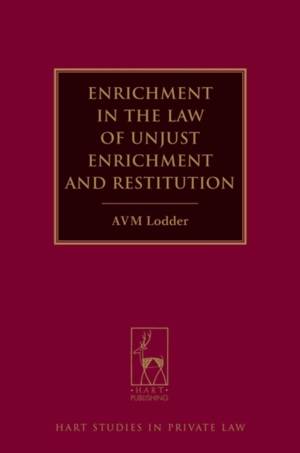
- Afhalen na 1 uur in een winkel met voorraad
- Gratis thuislevering in België vanaf € 30
- Ruim aanbod met 7 miljoen producten
- Afhalen na 1 uur in een winkel met voorraad
- Gratis thuislevering in België vanaf € 30
- Ruim aanbod met 7 miljoen producten
Zoeken
Enrichment in the Law of Unjust Enrichment and Restitution
Hart Studies in Private Law - no. 3
Andrew Lodder
€ 198,95
+ 397 punten
Omschrijving
Enrichment is key to understanding the law of unjust enrichment and restitution. This book provides a comprehensive analysis of the concept of enrichment and its implications for restitutionary awards. Dr Lodder argues that enrichment may be characterised either factually or legally, and explores the consequences of that distinction. In factual enrichment cases, the measure of enrichment is the objective value received. This is the basis of many awards of money had and received, quantum meruit, quantum valebat and money paid. In legal enrichment cases, the benefit is the acquisition of a specific right or the release of a specific obligation. The remedy is restitution of that right or reinstatement of that obligation. It is demonstrated that specific restitution of the defendant's legal enrichment is often the basis for resulting trusts, rescission, rectification and subrogation. This book has profound implications for understanding restitutionary awards and the relationship between the enrichment inquiry and other aspects of the law of unjust enrichment, including the 'at the expense of' inquiry and the defence of change of position.
Specificaties
Betrokkenen
- Auteur(s):
- Uitgeverij:
Inhoud
- Aantal bladzijden:
- 276
- Taal:
- Engels
- Reeks:
- Reeksnummer:
- nr. 3
Eigenschappen
- Productcode (EAN):
- 9781849463294
- Verschijningsdatum:
- 6/07/2012
- Uitvoering:
- Hardcover
- Formaat:
- Genaaid
- Afmetingen:
- 156 mm x 234 mm
- Gewicht:
- 548 g

Alleen bij Standaard Boekhandel
+ 397 punten op je klantenkaart van Standaard Boekhandel
Beoordelingen
We publiceren alleen reviews die voldoen aan de voorwaarden voor reviews. Bekijk onze voorwaarden voor reviews.











